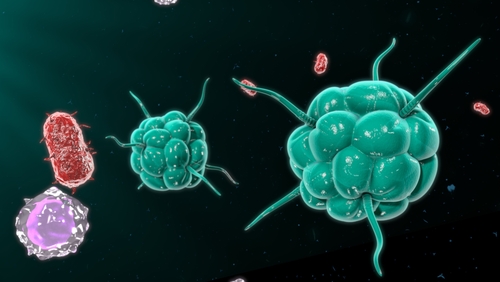Researchers have identified an enzyme called IFI16 whose expression is key for immune cells to detect danger and initiate an immune response. The findings have the potential to improve immunotherapies used to treat cancer and autoimmune diseases.
This study, “IFI16 is required for DNA sensing in human macrophages by promoting production and function of cGAMP,” was recently published in Nature Communications.
Cells from our immune system are key to monitoring the body for danger signals. While the presence of DNA from bacteria or viruses can trigger the danger sensors of the immune system, damaged or dying cells are also effective in alarming the immune system.
When cells are damaged or dying, their DNA often accumulates outside the nucleus. This triggers an alarm system that communicates the dangerous situation to the surrounding immune cells. The mechanism behind this complex cellular response is still not clear.
Now, researchers at Aarhus University in Denmark found that a protein called IFI16 was necessary for a subset of immune cells called macrophages to be able to detect DNA particles and activate an immune response. Genetically deleting the gene that codes for IFI16 impairs these immune cells from sensing foreign DNA and blocks the production of interferon, a signaling protein that would activate the immune alarm system.
Additional experiments revealed that IFI16 function in activating and controlling the immune response was related to another protein called STING.
“STING’s function and its degree of activity play a significant role in how well the body fights conditions when it is exposed to something that is foreign or abnormal such as infections and cancer,” the study’s senior author, Martin R. Jakobsen, said in a news release.
They found that macrophages needed IFI16 to activate STING, which in turn would activate the immune sensing and signaling when DNA challenges promote interferon production and a general immune response.
“By using different molecular biological methods, we could clearly demonstrate that our immune cells only need a very small fraction of the IFI16 protein for STING to function optimally,” Jakobsen said.
The new findings could be used to develop tools that support current immunotherapies and boost the immune defense system against tumors by using synthetically designed molecules that can specifically target and trigger STING and IFI16, Jakobsen said.


